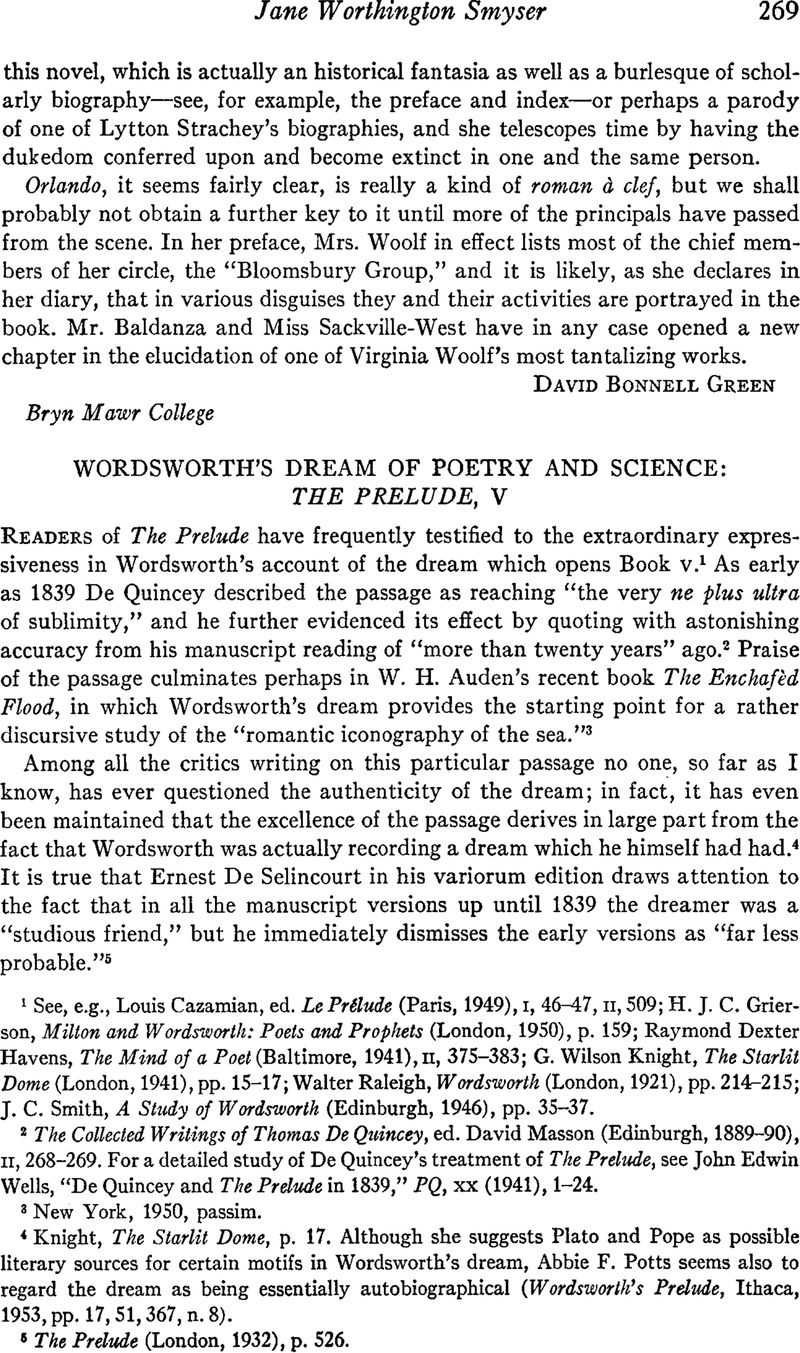Published online by Cambridge University Press: 02 December 2020

1 See, e.g., Louis Cazamian, ed. Le Prélude (Paris, 1949), i, 46–47, ii, 509; H. J. C. Grierson, Milton and Wordsworth: Poets and Prophets (London, 1950), p. 159; Raymond Dexter Havens, The Mind of a Poet (Baltimore, 1941), ii, 375–383; G. Wilson Knight, The Starlit Dome (London, 1941), pp. 15–17; Walter Raleigh, Wordsworth (London, 1921), pp. 214–215; J. C. Smith, A Study of Wordsworth (Edinburgh, 1946), pp. 35–37.
2 The Collected Writings of Thomas De Quincey, ed. David Masson (Edinburgh, 1889–90), ii, 268–269. For a detailed study of De Quincey's treatment of The Prelude, see John Edwin Wells, “De Quincey and The Prelude in 1839,” PQ, xx (1941), 1–24.
3 New York, 1950, passim.
4 Knight, The Starlit Dome, p. 17. Although she suggests Plato and Pope as possible literary sources for certain motifs in Wordsworth's dream, Abbie F. Potts seems also to regard the dream as being essentially autobiographical (Wordsworth's Prelude, Ithaca, 1953, pp. 17, 51, 367, n.8).
5 The Prelude (London, 1932), p. 526.
6 The Prelude (A2C), v.50; (1850), v.51. All references to The Prelude are to the ed. mentioned in the preceding footnote. Parentheses indicate the texts of 1805, 1850, or the variant readings from the MSS. described by De Selincourt on pp. xvi–xxv.
7 The Prelude (1805), v.142–143, 147; (1850), v.143–144, 148.
8 The Poet Wordsworth (Oxford, 1950), p. 123.
9 It is interesting to observe that in the only other passage in The Prelude where a change in person is made, a falsification enters: in the famous passage about “the boy” of Winander who blew mimic hootings to the owls, the boy was originally Wordsworth himself (Darbishire, The Poet Wordsworth, p. 111).
10 Œuvres de Descartes, ed. Charles Adam and Paul Tannery (Paris, 1879–1910), x, 179–188.
11 For bibl. references, see J. Sirven, Les Années d'apprentissage de Descartes (Albi, 1928), pp. 116–132; Jacques Maritain, Le Songe de Descartes (Paris, 1932); Norman Kemp Smith, New Studies in the Philosophy of Descartes (New York, 1952), pp. vii, 15–17. In an appendix (pp. 33–39) to his first ch., Smith translates the story of Descartes' dream as it appears in Baillet's Vie de Descartes.
12 Œuvres, x, 173, “Avertissement.”
13 E.g., “Mirum videri possit, quare graves sententiæ in scriptis poetarum, magis quam philosophorum. Ratio est quod poetæ per enthusiasmum & vim imaginationis scripsere: sunt in nobis semina scientiæ, ut in silice, qua? per rationem a pbilosophis educuntur, per imaginationem a poetis excutiuntur magisque elucent” (Œuvres, x, 217).
14 It is highly unlikely that Wordsworth ever read Baillet's life of the great French rationalist, and there is no evidence of any kind that he did so. Furthermore, as I have already maintained, the early versions of The Prelude are closer to truth, and in the early versions Wordsworth said that he was “told” the dream.
15 One recalls Coleridge's ambitious desire “to devote an entire work to the subject of dreams, visions, ghosts, and witchcraft, in which I might first give, and then endeavor to explain, the most interesting and best attested fact of each, which has come within my knowledge, either from books or personal testimony” (The Complete Works of Samuel Taylor Coleridge, ed. W. G. T. Sheed, New York, 1860, ii, 135; this is reprinted in Inquiring Spirit, ed. Kathleen Coburn, New York, 1951, p. 52). For Coleridge's knowledge of Descartes, see Julian Lindsay, “Coleridge Marginalia in a Volume of Descartes,” PMLA, xlix (1934), 184–195.
16 The Prelude (1805) x.372–373.
17 Book v of The Prelude was composed in the early months of 1804—see De Selincourt, The Prelude, p. xxxv; Havens, The Mind of a Poet, ii, 339; Darbishire, The Poet Wordsworth, pp. 94–95. Because Wordsworth speaks of having frequently recalled the dream (1805, v.140–143), he must have heard of the dream well before 1804.
18 Georges Bussiére and Emile Legouis, Le Général Michel Beaupuy (Paris, 1891), pp. 9, 16; Emile Legouis, The Early Life of William Wordsworth, trans. J. W. Matthews (New York, 1918), p. 203.
19 The Prelude (1805) ix.413–414; (1850) ix.408–410.
20 Darbishire, The Poet Wordsworth, p. 95.
21 The Prelude (1805) ix.466–501; (1850) ix.465–501.
22 The Prelude (1805) ix.443–466; (1850) ix. 437–465.
23 Mary E. Burton believes that the change was made to avoid the “explanatory ‘he said’,“ and the awkwardness of Wordsworth's telling what his friend thought (The One Wordsworth, Chapel Hill, 1942, pp. 192–193).
24 Collected Writings, ii, 268.
25 The second essay, containing the discussion of The Prelude, appeared in Tail's Magazine, vi (Feb. 1839), 90–103. Wordsworth's revisions in 1839 were made during March 1839; see De Selincourt, The Prelude, p. xix.
26 Blake, Coleridge, Wordsworth, Lamb, etc., ed. Edith J. Morley (London, 1922), p. 59. See also The Correspondence of Henry Taylor, ed. Edward Dowden (London, 1888), p. 96.
27 Cf. Havens, The Mind of a Poet, ii, 383: “all of 51–6 might better have been omitted.”